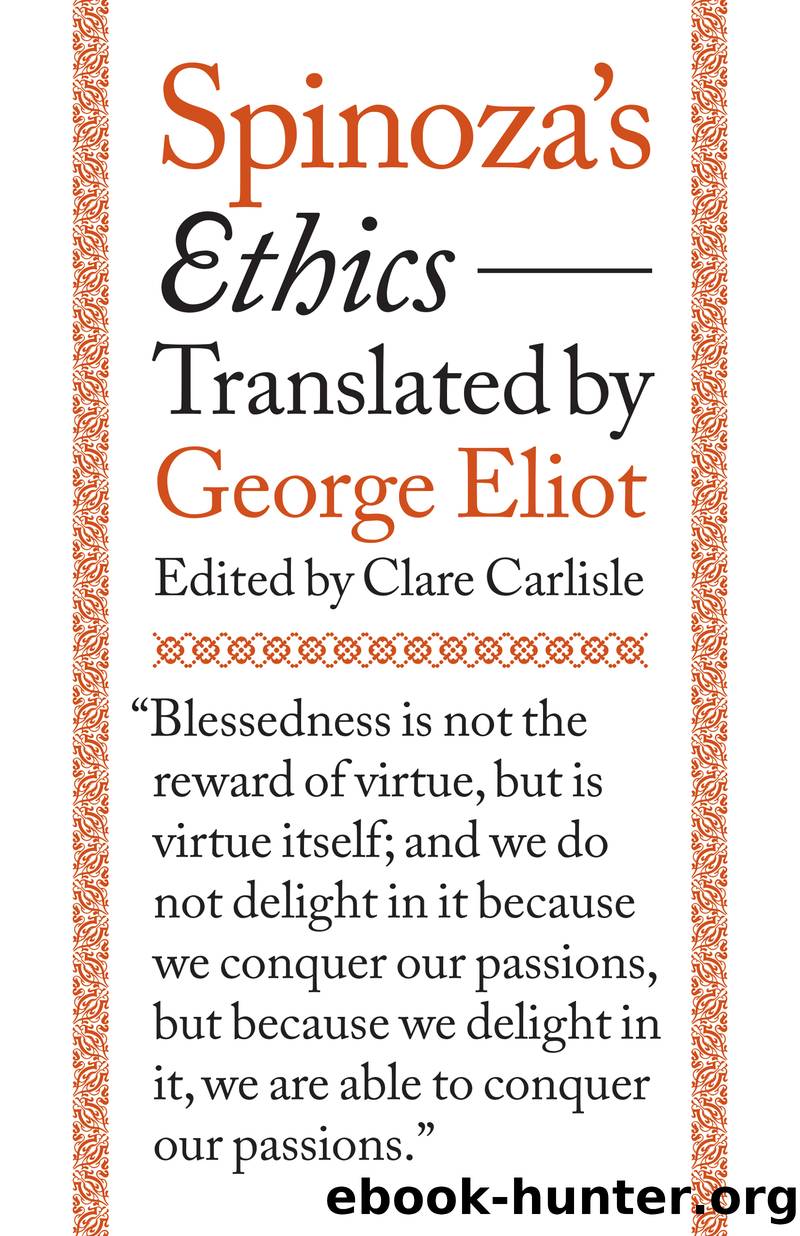Spinoza's Ethics by Benedictus de Spinoza;Clare Carlisle;

Author:Benedictus de Spinoza;Clare Carlisle;
Language: eng
Format: epub
Publisher: Princeton University Press
Published: 2019-11-11T00:00:00+00:00
DEFINITIONS OF THE EMOTIONS
1.â â Desire is the essence of man, so far as we conceive that essence [to be] determined to an action by any given affection.
Explan. I have said above in the scholium to proposition IX of this Part, that desire is an appetite attended with consciousness; and that appetite is the essence of man, so far as it is determined to actions which support its own preservation. But in the same scholium I have also intimated, that I recognize no real difference between human appetite and desire. For whether man be conscious of his appetite or not, the appetite remains the same; and therefore that I might not appear guilty of tautology, I have chosen not to define desire by appetite, but to so define it that every tendency of human nature which we signify by the name of appetite, will, desire or impulse may be comprehended in one term. I might indeed have said that desire is the essence of man, conceived as determined to any action; but from this definition (by prop. XXIII, Part II) it would not follow that the mind can be conscious of its desire or appetite. Hence that I might include the cause of this consciousness, it was necessary (according to same prop.) to add: so far as it is determined to act by any given affection. For by any affection of the human essence we understand a certain state of that essence, whether it be innate,28 whether it be conceived solely by the attribute of thought, or solely by the attribute of extension, or lastly whether it be referred to both these attributes at once. [By desire I here understand all of manâs endeavours, impulses, appetites and volitions, which vary with the varying constitution of the man, and are often so opposed to one another that he is pulled in different directions and does not know which way to turn.]29
2.â â Pleasure is the transition of man from less to greater perfection.
3.â â Pain is the transition of man from greater to less perfection.
Explan. I say transition, for pleasure is not that perfection itself. If we were born with that perfection to which we pass, we would experience no emotion of pleasure in its possession; and this appears more clearly from the contrary emotion of pain. For that pain consists in the transition to a lower degree of perfection, but not in that lower degree of perfection itself, no one can deny, since man is incapable of feeling pain, so far as he possesses any degree of perfection. Nor can we say that pain consists in the privation of greater perfection; for privation is nothing. But the emotion of pain is something positive and can therefore be nothing else than the process of passing to a lower degree of perfection, i.e. a process by which manâs power of action is diminished or restrained. See schol. prop. XI, Part III. The definitions of hilarity, titillation, melancholy and bodily suffering [Doloris] I omit, because they belong principally to the body and are simply species of pleasure and pain.
Download
This site does not store any files on its server. We only index and link to content provided by other sites. Please contact the content providers to delete copyright contents if any and email us, we'll remove relevant links or contents immediately.
The remains of the day by Kazuo Ishiguro(8382)
Tools of Titans by Timothy Ferriss(7807)
Giovanni's Room by James Baldwin(6807)
The Black Swan by Nassim Nicholas Taleb(6761)
Inner Engineering: A Yogi's Guide to Joy by Sadhguru(6439)
The Way of Zen by Alan W. Watts(6288)
Asking the Right Questions: A Guide to Critical Thinking by M. Neil Browne & Stuart M. Keeley(5355)
The Power of Now: A Guide to Spiritual Enlightenment by Eckhart Tolle(5330)
The Six Wives Of Henry VIII (WOMEN IN HISTORY) by Fraser Antonia(5234)
Astrophysics for People in a Hurry by Neil DeGrasse Tyson(4998)
12 Rules for Life by Jordan B. Peterson(4160)
Housekeeping by Marilynne Robinson(4059)
The Ethical Slut by Janet W. Hardy(4036)
Skin in the Game by Nassim Nicholas Taleb(3965)
Double Down (Diary of a Wimpy Kid Book 11) by Jeff Kinney(3922)
Ikigai by Héctor García & Francesc Miralles(3889)
The Art of Happiness by The Dalai Lama(3844)
Skin in the Game: Hidden Asymmetries in Daily Life by Nassim Nicholas Taleb(3720)
Walking by Henry David Thoreau(3681)
